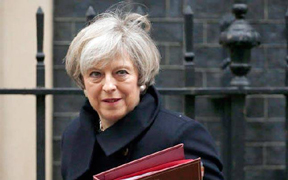 LONDON: British Parliament overwhelmingly supported a bill today empowering Prime Minister Theresa May to start crucial negotiations by March 31 on leaving the European Union, bringing Brexit a step closer.
LONDON: British Parliament overwhelmingly supported a bill today empowering Prime Minister Theresa May to start crucial negotiations by March 31 on leaving the European Union, bringing Brexit a step closer.
The draft legislation of the European Union (Notification of Withdrawal) Bill was approved by 494 votes to 122 by the House of Commons after its final debate.
The bill allows Prime Minister May to invoke Article 50 of the Lisbon Treaty to begin a two-year period of negotiations for the UK’s new deal as a non-member of the European Union (EU) by 2019.
Now that the bill had passed the Commons, it will be debated in the House of Lords after it returns from recess on February 20, where it is expected to be given the final nod.
Earlier, the Commons debated the last set of amendments to the Bill, including on key principles for the negotiation process, before the bill went on to its third and final reading for the vote.
Opposition Labor leader Jeremy Corbyn had instructed his MPs to vote in favor of the bill whether any amendments are made or not. However, he faced a second round of rebellion after over 49 MPs had defied the whip at the last vote earlier this month.
Some 52 Labor MPs rebelled in vote today, including Shadow business secretary Clive Lewis who resigned shortly beforehand.
Shadow home secretary Diane Abbott, who missed last week’s initial vote on the bill, backed it this time.
She told the BBC she had “a lot of misgivings about the idea of a Tory Brexit” and predicted the UK would “come to regret it”, but added: “I’m a loyal member of the shadow cabinet and I’m loyal to Jeremy Corbyn.”
May herself faced a rebellion of up to a dozen of her Conservative MPs, but she managed to minimize the Tory rebellion on Tuesday by promising a Commons vote on the Brexit agreement before it is finalized. .
Keir Starmer, the shadow Brexit secretary, welcomed this as an important concession but others have dismissed it as a “take it or leave it” offer.
The bill was tabled last month after the Supreme Court ruled that MPs and peers must have a say before Article 50 of the Lisbon Treaty could be triggered. May had initially sought to bypass parliament.
It rejected the UK government’s argument that May had sufficient executive powers to trigger Brexit without consulting Parliament.
David Davis, UK minister for exiting the European Union, had opened the debate in the House of Commons with a clear message to MPs that they must implement a decision made by the people in the June 2016 referendum with 51.9 per cent wanting to leave the EU and 48.1 per cent wanting to remain within the 28-nation economic bloc.
Afterwards, Davis hailed the “historic vote” and said it is now time for everyone, whichever way they voted in the referendum, to unite to make a success of the important task at hand for our country.
Later, Corbyn tweeted: “Real fight starts now. Over next two years Labor will use every opportunity to ensure Brexit protects jobs, living standards and the economy.”
But Scottish First Minister Nicola Sturgeon accused him of giving the Conservatives a “blank cheque”.
She tweeted: “You didn’t win a single concession but still voted for the bill. Pathetic.”
Liberal Democrat leader Tim Farron said the party’s peers would seek to amend the bill in the Lords, including another attempt to ensure a referendum on the final Brexit deal. –PTI





